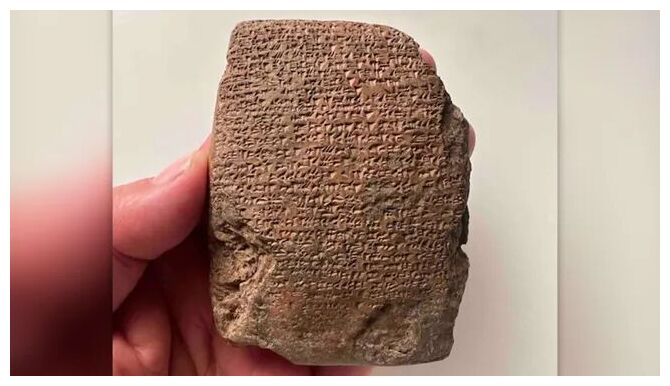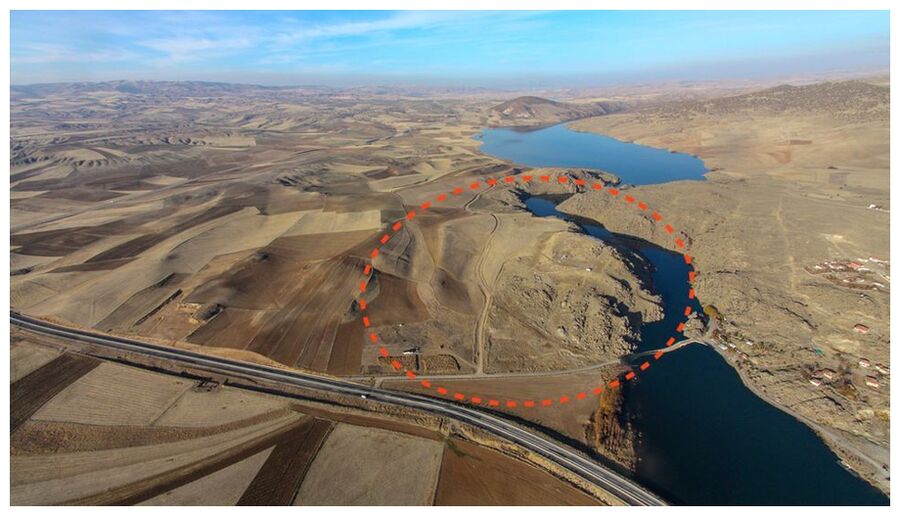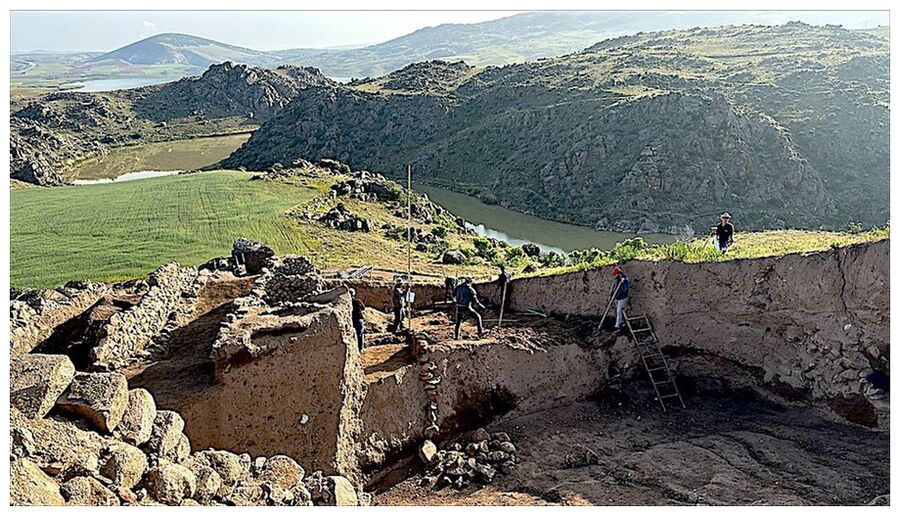
The palm-size tablet was found in May 2023 by Kimiyoshi Matsumura, an archaeologist at the Japanese Institute of Anatolian Archaeology, amid the Hittite ruins at Büklükale, about 37 miles (60 kilometers) southeast of the Turkish capital Ankara.
Archaeologists think Büklükale was a major Hittite city. The new discovery suggests it was also a royal residence, perhaps on a par with the royal residence in the Hittite capital Hattuša (also spelled Hattusha), about 70 miles (112 km) to the northeast.
According to a translation by Mark Weeden, an associate professor of ancient Middle Eastern languages at University College London, the first six lines of cuneiform text on the tablet say, in the Hittite language, that "four cities, including the capital, Hattusa, are in disaster," while the remaining 64 lines are a prayer in the Hurrian language asking for victory.
The Hittites used the Hurrian language for religious ceremonies, Matsumura told Live Science, and it appears that the tablet is a record of a sacred ritual performed by the Hittite king.
"The find of the Hurrian tablet means that the religious ritual at Büklükale was performed by the Hittite king," he said in an email. "It indicates that, at the least, the Hittite king came to Büklükale ... and performed the ritual."

Archaeologists think the first Hittite kingdoms formed in central Anatolia — now Turkey — in about 2100 B.C. and the Hittites had become a major regional power by 1450 B.C. Hittites appear in the Hebrew Bible, and ancient Egyptian inscriptions record that the Hittite Empire fought them in 1274 B.C. at the Battle of Kadesh — an ancient city near modern-day Homs, Syria — in one of history's earliest battles.
Matsumura and his colleagues have been excavating the ruins at Büklükale for about 15 years. They'd found only broken clay tablets before, but this one is in near-perfect condition.
Hurrian was originally the language of the region's Mitanni kingdom, which eventually became a Hittite vassal state. The language is still poorly understood, and experts have spent several months trying to learn the inscription's meaning, Matsumura said.
It turns out, the Hurrian writing is a prayer addressed to Teššob (also spelled Teshub), the Hurrian name of the storm god who was the head of both the Hittite and Hurrian pantheons. It praises the god and his divine ancestors, and it repeatedly mentions communication problems between the gods and humans, he said.
The prayer then lists several individuals who seem to have been enemy kings and concludes with a plea for divine advice, Matsumura said.
Civil war

As described by historian Eric Clein in 1177 B.C.: The Year Civilization Collapsed (Princeton University Press, 2014), the reasons for the collapse aren't known, but they may include famines caused by climate changes.
However, the invasion referenced by the newfound tablet doesn't seem to be related. Matsumura said the tablet dates to the reign of the Hittite king Tudhaliya II, between about 1380 to 1370 B.C. — roughly 200 years before the Late Bronze Age collapse.
The tablet "seems to come from a period of civil war which we know about from other [Hittite] texts," he said. "During this time, the Hittite heartland was invaded from many different directions at once ... and many cities were temporarily destroyed."
"The new find from Büklükale confirms the pivotal role of Hurrian religious traditions at the Hittite royal court in the early empire period," Daniel Schwemer, chair of ancient Near Eastern studies at the University of Würzburg in Germany, told Live Science.
Schwemer, who wasn't involved in the discovery, noted that the find has not been formally published in a peer-reviewed journal yet. But "the new tablet constitutes a very significant addition to our knowledge of Hurrian language devotional literature," he said.



Reader Comments
That means, I wondered until a few years ago ...
The armed forces of certain nations will be ready and dispersed etc to control the remains changing borders etc.
Rereading history with that in mind helps part some of the fog written by the victors.
A nova (even smaller events) will cause the elimination of almost all electronics, i.e. communication, finances & banking, industry, and transportation. I can see no communication, transport and payment for those troups - which will rather care for their own survival and their families.
Reading description of the events and considering the state of electrical/electronical machinery at that time - this prediction is an easy one. And does not originate from Ben.
By the way, this is confirmed by the "EMP" effect of nuclear weapons. Due to lower energy (compared to the sun), the "energy saturation" is much lower, and thus the spatial effect is more localized.
Very few electronics are protected against EM field, and almost none agains high-power fields. Usually only against grid-bound interferences dimensioned for the average thunderstorm level.
The issue is, this is effing expensive, and basically nobody does it for commercial products. Which includes automobiles, transportation, telecommunications and mains power supply facilities.